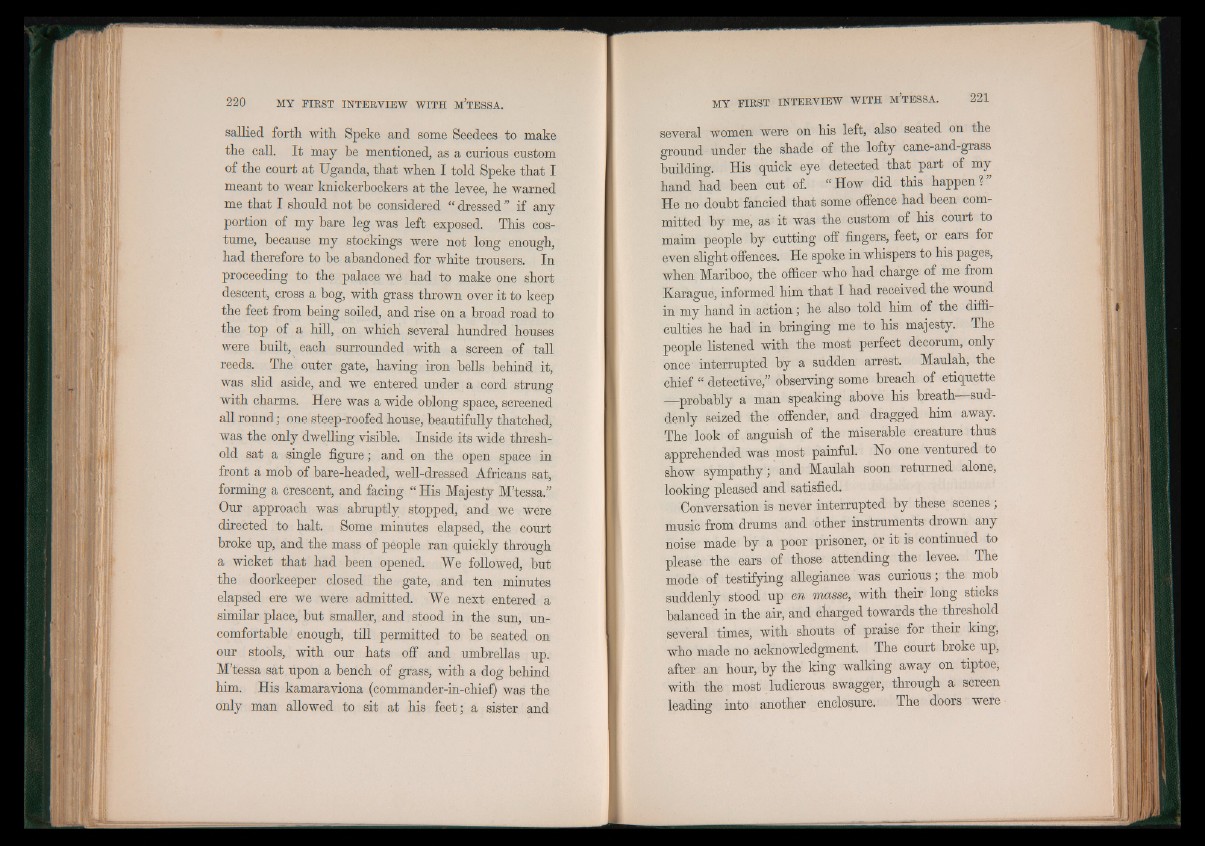
sallied forth, with Speke and some Seedees to make
the call. I t may be mentioned, as a curious custom
of the court at Uganda, that when I told Speke that I
meant to wear knickerbockers at the levee, he warned
me that I should not be considered “ dressed” if any
portion of my bare leg was left exposed. This costume,
because my stockings were not long enough,
had therefore to be abandoned for white trousers. In
proceeding to the palace w6 had to make one short
descent, cross a bog, with grass thrown over it to keep
the feet from being soiled, and rise on a broad road to
the top of a hill, on which several hundred houses
were built, each surrounded with a screen of tall
reeds. The outer gate, having iron bells behind it,
was slid aside, and we entered under a cord strung
with charms. Here was a wide oblong space, screened
all round; one steep-roofed house, beautifully thatched,
was the only dwelling visible. Inside its wide threshold
sat a single figure; and on the open space in
front a mob of bare-headed, well-dressed Africans sat,
forming a crescent, and facing “His Majesty M’tessa.”
Our approach was abruptly stopped, and we were
directed to halt. Some minutes elapsed, the court
broke up, and the mass of people ran quickly through
a wicket that had been opened. We followed, but
the doorkeeper closed the gate, and ten minutes
elapsed ere we were admitted. We next entered a
similar place, but smaller, and stood in the sun, uncomfortable
enough, till permitted to be seated on
our stools, with our hats off and umbrellas up.
M’tessa sat upon a bench of grass, with a dog behind
him. His kamaraviona (commander-in-chief) was the
only man allowed to sit at his feet; a sister and
several women were on his left, also seated on the
ground under the shade of the lofty cane-and-grass
building. His quick eye detected that part of my
hand had been cut of. “How did this happen?”
He no doubt fancied that some offence had been committed
by me, as it was the custom of his court to
maim people by cutting off fingers, feet, or ears for
even slight offences. He spoke in whispers to his pages,
when Mariboo, the officer who had charge of me from
Karague, informed him that I had received the wound
in my hand in action; he also told him of the difficulties
he had in bringing me to his majesty. The
people listened with the most perfect decorum, only
once interrupted by a sudden arrest. Maulah, the
chief “ detective,” observing some breach of etiquette
—probably a man speaking above his breath suddenly
seized the offender, and dragged him away.
The look of anguish of the miserable creature thus
apprehended was most painful. No one ventured to
show sympathy ; and Maulah soon returned alone,
looking pleased and satisfied.
Conversation is never interrupted by these scenes ;
music from drums and other instruments drown any
noise made by a poor prisoner, or it is continued to
please the ears of those attending the levee. The
mode of testifying allegiance was curious; the mob
suddenly stood up en masse, with their long sticks
balanced in the air, and charged towards the threshold
several times, with shouts of praise for their king,
who made no acknowledgment. The court broke up,
after an hour, by the king walking away on tiptoe,
with the most ludicrous swagger, through a screen
leading into another enclosure. The doors were